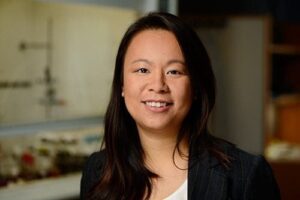This post is part of a new series on the Ralph O’Connor Sustainable Energy Institute (ROSEI) website that will feature Q&A’s with our affiliated researchers. First up is Sara Thoi, an assistant professor in the Department of Chemistry who also serves on ROSEI’s leadership council.
How did you first get involved with or learn about sustainability?

Sara Thoi
Sara Thoi: My first research project in sustainability started in a high school science fair. My lab partner and I designed a parabolic dish using craft supplies and foil that would concentrate sunlight. To measure if the parabolic dish was constructed correctly, we measured the temperature at the focal point. To our amazement, the temperature was so hot, it melted our probe! It was exhilarating to see that we were able to design something from scratch and be able to concentrate solar energy!
Why are you passionate about sustainability/renewable energy?
ST: Growing up in an immigrant family, it was instilled in me that resources are limited and we should never be wasteful. As I grew older and learned about climate change, I was alarmed by our wasteful practices and unsustainable energy usage and I was convinced that I have a responsibility to help find a solution. Since then, I have taken every opportunity to work in renewable energy, from biodiesel, catalysis, fuel cells, to batteries. Now as a new parent, this urgency has intensified – I am personally motivated to ensure a world in which my daughter and her future generation can be safe and prosper.
How does your commitment to sustainability play out in your everyday life?
ST: I think sustainability plays out in every part of my life. I try to buy less and reuse as much as possible – I am not ashamed to say that I often peruse the neighborhood yard sale for used toys and old kitchenware. I drive a 20-year-old Corolla because, well, it still works (and has good gas mileage)! I hope our everyday efforts, while small, will help shape the conversation around sustainability and bring about larger changes.
Tell us about your research, and what aspects currently or in the future tie into sustainable energy efforts?
ST: My research group is broadly focused on energy conversion and storage. One part of my group is interested in converting waste products like carbon dioxide and nitrate into more useful chemical feedstocks and carbon-neutral fuels. We hope to drive this chemistry using electricity generated from renewable energy under ambient temperature and pressure in water. The other part of my group is developing high-density energy storage devices that are inexpensive and reliable. In the past few years, we have focused our efforts on lithium-sulfur batteries, which is a promising alternative to lithium ion batteries with up to 10x the storage capacity and contain earth-abundant raw materials like sulfur. I believe catalytic chemical transformations and energy storage are two solutions (of many) to the large multifaceted problem of sustainable energy.
Is there an article, book or podcast that people can check out to help better understand the area you work in or your specific work?
ST: The following papers summarize our technical work in the two fields.
Batteries: https://pubs.rsc.org/en/content/articlelanding/2022/cc/d1cc07087h
Catalysis: https://pubs.acs.org/doi/abs/10.1021/acs.accounts.1c00680
What advice or suggestions do you have for students who want to pursue careers in sustainable energy?
ST: It is easy to feel that your work is insignificant compared to the size of the climate change challenge, but know that you are part of a greater team that are piecing together a solution to a very complex problem. The skills and knowledge you learn today will serve you in ways you will never imagine, so stay true to your passion and keep chugging away!
How has the creation of ROSEI affected sustainable energy efforts at Hopkins?
ST: I think ROSEI will have several large impacts on the Hopkins community. First, ROSEI will build connections between disparate, but related areas of energy research at Hopkins. By providing seed funding for collaborative projects and hosting multidisciplinary seminars and informal social events, ROSEI will build a community of Hopkins researchers to jumpstart groundbreaking projects. We have already funded three innovative research initiatives that bring together researchers from KSAS, Whiting, SAIS, and APL to tackle challenging problems in renewable energy, fuel generation, and energy policy. Second, ROSEI aims to be an anchor for energy research by investing in state-of-the-art instruments and equipment and building up our research infrastructure. Finally, one of our goals in ROSEI is to become a trusted voice in the energy field that can guide legislation and inform the general public. We have initiated educational outreach activities and aim to hold cross-cutting meetings with policymakers and researchers.
